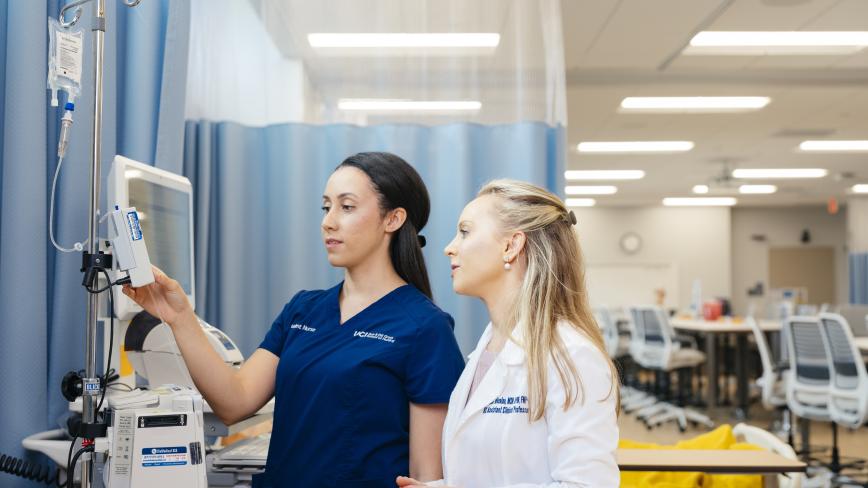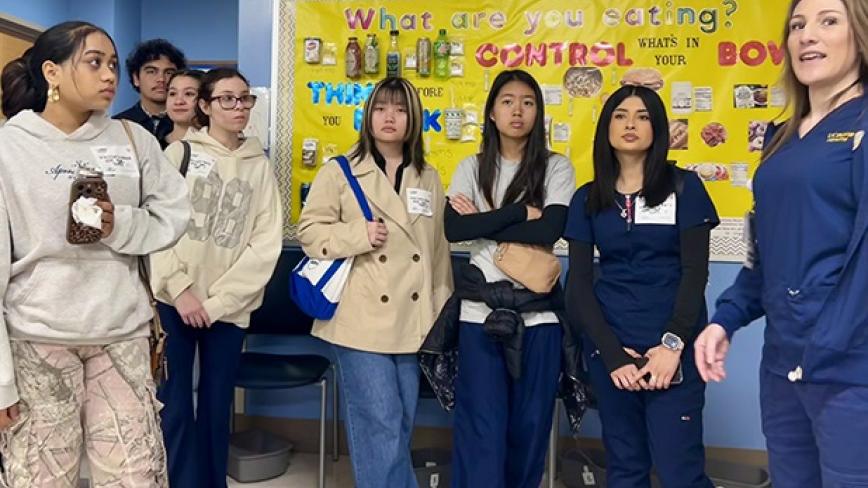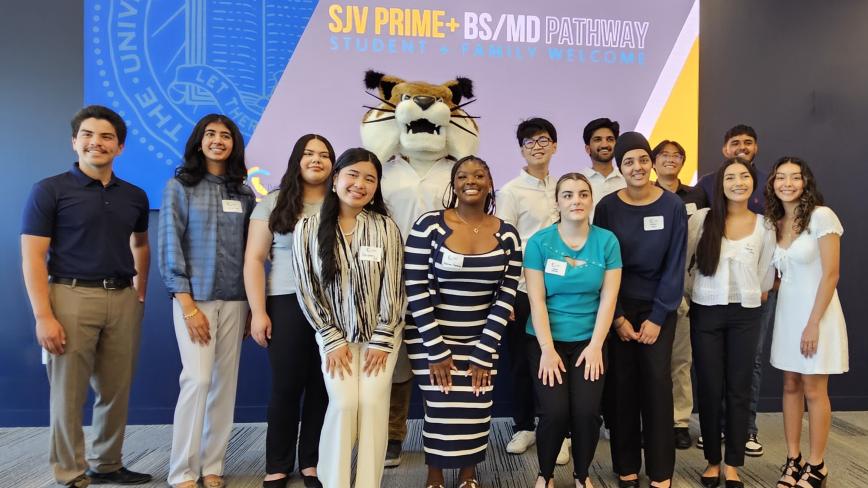The University of California remains committed to developing future health care professionals to meet the state’s workforce shortages by offering various paths that lead to successful careers across health professions.
Pathway programs help chart a course for young people who might otherwise think training to become a doctor, lawyer, or other professional position is out of reach.
Pathway programs typically begin before college, with some paths starting as early as middle school and junior high. These programs typically include a series of preparatory courses, continuous mentorship guidance, and ongoing career coaching to support students at every step of their journey.
Strengthening social and economic mobility
In addition to increasing the pipeline of future health care professionals for California, pathway programs also indirectly contribute to social and economic mobility for individuals who otherwise may not have considered careers in health care.
By introducing young students to the possibilities of economically rewarding careers, these programs provide students with the skills, resources, career-connected education, and networks they’ll need to succeed in the health care workforce and improve their overall prospects for future financial well-being.
One out of every three UC students who enter college in the bottom 20 percent of income move up to the top 20 percent of income as adults, a rate that is higher than colleges and universities across the state and nation.
Pathway programs beginning in high school
For some California high schoolers, learning about careers in health care doesn’t just start in college.
In April 2025, students from Elk Grove Unified School District toured UC Davis Health’s campus as part of that school district’s Cosumnes Oaks Medical Careers Pathway, a program designed to provide high school students with skills and foundational knowledge to pursue post-secondary options for health care careers and educational programs.
The program also provides students with courses in anatomy and medical terminology, physiology and advanced patient care skills. This partnership is already making an impact on students, with one student commenting about their experience on the tour:
“Visiting [the] cardiology [department] opened up a new field I never really considered previously. I have a passion for the food we eat and exercise, and this experience has shown me a field that combines a little of both. [I saw] that there are different ways to help people, not just administering medicine and doing surgeries.”
Growing our own: pathway programs in the San Joaquin Valley
A new chapter in health care pathways is being written in the heart of the San Joaquin Valley.
Last spring, UC Merced broke ground on its Medical Education Building, which will house SJV PRIME+—a bachelor’s to medical degree pathway designed to train future physicians interested in delivering care in the Central Valley. A partnership between UC Merced, UCSF Fresno and the UCSF School of Medicine, this new entrant in the pathway program landscape accepts a cohort of first-year undergraduate students who have an expressed intent to pursue health careers in the San Joaquin Valley, helping to address the region’s urgent need for health care professionals.
The UCSF Fresno Doctors Academy is another program in the region designed for high school students interested in health professions. As part of the program, students participate in personal and professional development workshops, receive academic counseling and support services, attend lectures from medical and health practitioners, work alongside practicing professionals in “observership” placements in medical or health settings, and enroll in summer school enrichment programs.
Monique Kaur Atwal, M.D., is an alum of the UCSF Fresno Sunnyside High School Doctors Academy and offers perspectives on her participation in the program. “It’s a unique program that gave me exposure to the many options in health care professions.”
“When I started in the Doctor’s Academy program, I thought I wanted to be a dentist, but then in my internship, I shadowed an anesthesiologist and became very interested in that specialty for a while.” Dr. Atwal ultimately selected psychiatry as her specialty, earning her undergraduate degree in psychology at UCLA, her medical degree at UC Davis School of Medicine in the UC PRIME program and residency training in psychiatry at UCSF Fresno. “I chose psychiatry because I enjoy listening to my patients and have the privilege of learning their life stories,” she said. Dr. Atwal continues to provide care in the Valley with the Fresno County Department of Behavioral Health.
A cross-system path to careers in health care
To expand access to health care careers and address the state’s health professional shortage, UC is partnering with other state and community colleges to develop a multi-campus model that supports students on their journey into the medical field.
One such pathway program is the California Medical Scholars Program (CMSP), a program designed to reduce barriers to entry to medical and other health care careers for students from economically and educationally challenged backgrounds as well as from communities that are experiencing growing shortages in health care professionals, especially primary care physicians.
In 2021, California State Senator Melissa Hurtado proposed Senate Bill 40 (now law) to establish a statewide program to address the shortage of primary care physicians in the state by increasing training and educational opportunities for community college students interested in pursuing a career in medicine.
The CMSP program is structured around four Regional Hubs of Healthcare Opportunity, each led by a UC medical school (UC Davis School of Medicine, UC Riverside School of Medicine, UC San Diego School of Medicine and UCSF School of Medicine Fresno Regional Campus).
The campuses collaborate with local community colleges, four-year universities, including California State University campuses, and health care institutions to provide students with tailored academic support on their path to medical school. Students receive initial exposure to various medical specialties through advising, internships, and volunteer health care experiences early in their community college careers.
As undergraduate students complete their community college academic requirements and transfer to four-year colleges and universities, they receive support to complete prerequisite coursework, navigate the application process, and prepare for the Medical College Admission Test (MCAT).
Unique pathway programs are a part of the fabric of the UC Health system
Pathway programs across the UC health professional schools can take on various formats, each tailored to fit the needs of the surrounding communities. Here are a few brief profiles of the many programs available to students across California.
- UC Davis California Medicine Scholars Program (CMSP) AvenueM: a community college to medical school pathway program, CMSP AvenueM aims to reduce barriers to entry to medical and other health care careers. The program is designed for undergraduates interested in addressing the health care needs of Northern California’s urban, rural and remote populations. As part of the program, UC Davis School of Medicine partners with three transfer institutions – UC Davis, California State University (CSU), Sacramento, and Cal Poly Humboldt – and a network of community colleges feeding into them, to establish this robust educational ecosystem.
- UC Irvine School of Medicine MedAcademy: MedAcademy is a five-day immersive program that introduces high school students to medicine through hands-on experiences, interactive workshops, and mentorship. Participants practice medical resuscitation, suturing, and ultrasound techniques in state-of-the-art simulation labs, and explore clinical reasoning and anatomy through lectures. The program also emphasizes leadership, teamwork, and advocacy, offering insights from current medical students and faculty to inspire the next generation of physician-leaders.
- Health Coach Program at UC Riverside School of Medicine: This community-based collaborative seeks to reduce the number of patients with uncontrolled chronic conditions by training health coaches to support patient care by working with integral healthcare teams in a clinical setting. Health coach volunteers are pre-medical and pre-health students currently enrolled as juniors and seniors at an undergraduate institution or recent college graduates.
- UCLA School of Dentistry's Basic Dental Principles (BDP): The program offers undergraduate and post-baccalaureate students an opportunity to explore the field of dentistry through a structured, two-part experience. It begins with a two-quarter lecture series introducing students to various aspects of dentistry, taught by third-year UCLA dental students through a faculty-mentored teaching apprenticeship. Students who excel in the lecture series may continue to a hands-on laboratory course, led by second-year dental students, where they gain practical experience with dental techniques. The program is ideal for those seeking deeper insight into a potential career in dentistry.
- Doc-4-A-Day at UC San Diego School of Medicine: Twice a year, more than 150 high school students and teachers learn about health careers through hands-on clinical experiences led by first and second-year medical students at UC San Diego School of Medicine.
Bringing value back to the communities
Even for those who ultimately do not choose to pursue a career in the health professions, there are still multiple benefits that these pathway programs bring to the various communities across California. Johanna Navarrete, M.Ed., assistant director of pathway programs at UC Riverside, adds:
“...programs like CMSP are making a difference by identifying students who are bringing awareness to others about the importance of health care and medicine. They are educating their siblings, cousins, aunts and uncles with the tools and knowledge they’ve acquired as part of their experience. They’re bringing that back to their communities.”
About University of California Health
University of California Health comprises six academic health centers, 21 health professional schools, a Global Health Institute and systemwide services that improve the health of patients and the University’s students, faculty and employees. All of UC’s hospitals are ranked among the best in California and its medical schools and health professional schools are nationally ranked in their respective areas.



